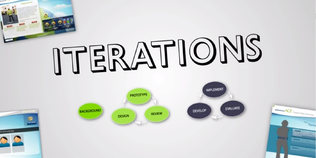Blog
Creating a Mobile Learning Library With Modern Technologies
by Richard Sites, studio executive

Search Our Blogs
Blog Categories
Subscribe to Our Blogs

Successful e-Learning Content Analysis
 by Richard Sites, studio executive
by Richard Sites, studio executive
All too often, e-learning projects are driven by content. Content identified as important by Subject Matter Experts. Content repurposed from instructor-led courses. Content the marketing department wants employees to know to increase sales. As creators of training, we are given this content and are expected to develop e-learning based on the assumption the content has been thoroughly vetted and does not need further review or analysis. However, typical content analysis performed by SMEs focuses on the knowledge they expect the learner to have, not how they expect the learner to apply that knowledge.
Have you had projects start like this? A mound of content and an expectation to turn that content into an e-learning course? I bet you have.
So, why is that most of us know learners must DO something to learn and transfer skills into their daily work, yet we still create boring, un-engaging, page-turning, content-focused e-learning?
I suggest the following reasons.
- Traditional views of training. Many people assume employees can improve their performance through knowledge – that they will take information and personally find ways to change their performance.
- Limited budget and time. Nothing is easier than putting a collection of content online in the form of a PowerPoint or page-turner.
- Pressure to include every possible piece of information. With reviewers asking “Where is _____?” [this very important piece of information that has to be in the course] we often feel pressured to include as much as possible without considering the real importance of this information or if the learner can access it in other ways.
- Lack of development skills. Most of us would like to do more with our e-learning, but we just don’t have the skills (or time to gain these skills) necessary to create high levels of interactivity.
- Impact of legacy training. Let’s be honest, it’s not easy to challenge the status quo. We might as well create the same old type of training that everyone is used to and not rock the boat.
For us to move beyond content dumping forms of e-learning, we must take the lead and consult with/advise our project sponsors on the importance of performance oriented e-learning. This does not necessarily mean we must abandon all that content, but rather look at how we can use that content a little differently.
 My very insightful colleague Ethan Edwards will be presenting a webinar next Wednesday titled, “The 5 Most Important Analysis Questions You’ll Ever Ask.” In this webinar, Ethan will identify the key questions critical for creating performance changing e-learning.
My very insightful colleague Ethan Edwards will be presenting a webinar next Wednesday titled, “The 5 Most Important Analysis Questions You’ll Ever Ask.” In this webinar, Ethan will identify the key questions critical for creating performance changing e-learning.
Ethan will discuss the following five questions to ask prior to creating e-learning:
- What do you expect learners to be able to DO after completing the course that they can’t do now?
- What are the consequences TO THE LEARNER if the learner fails to master the intended outcomes?
- Can you show me an active demonstration, a detailed simulation, or provide an opportunity to directly observe the desired performance?
- What specific performance mistakes do new learners regularly make?
- What tools, resources, job aids, or help do successful performers (or even experts) use to do these tasks?
These questions support us in making the best use of the limited time we have with SMEs to gather the information necessary for effective, performance oriented e-learning. Again, you can register for Ethan’s complimentary webinar on this topic next week.
I’d love to hear your thoughts. Do you experience the same content burden? How do you overcome this challenge? Are you using questions like Ethan has suggested to help create performance changing e-learning?
.png?width=135&height=135&name=ai-symbol-green%20(3).png)
About the Author: Allen Interactions
Comments
Would you like to leave a comment?
Related Blog Posts

By: Allen Interactions | Mar, 2016
Category: Custom Learning

Blog
Iterations: Content Doesn't Make Learning [Ep. 3]
by Richard Sites, studio executive
By: Allen Interactions | Apr, 2013
Category: Custom Learning

Blog
After-Action Review, From Struggle to Swagger
by Richard Sites, studio executive
By: Allen Interactions | Jul, 2020
Category: Custom Learning, Strategic Consulting
